Are Gluten and Rosacea Linked? Unlock 4 Powerful Tips for Reducing Skin Flare-ups
Did you know that people with rosacea are twice as likely to have celiac disease? 1 For many, gluten can be a hidden trigger, wreaking havoc on your gut and making your rosacea worse. Reducing gluten might be the key to healing your gut and calming your skin naturally.
What is the Connection Between Gluten and Rosacea?
Did you know that the link between gluten and rosacea might be making your rosacea worse? For many dealing with rosacea, gluten triggers an inflammatory response that exacerbates symptoms like facial redness and irritation. Not only that, but many people with rosacea have undiagnosed celiac disease or gluten sensitivity, which can have a hugely negative impact on their skin. Understanding this connection could be your first step toward calmer, clearer skin.
Dr. Tara’s Story: Chronic Gluten Consumption with No Immediate Skin Reactions or Allergy Symptoms
Despite regularly consuming bread and cereals without obvious issues (unlike instant flare-ups from red peppers or wine,) Dr. Tara’s skin appeared unaffected by gluten—a fact confirmed by negative results from celiac and allergy tests. However, her suspicion about diet’s impact on her skin persisted, especially when her rosacea symptoms temporarily cleared during illnesses that emptied her stomach.
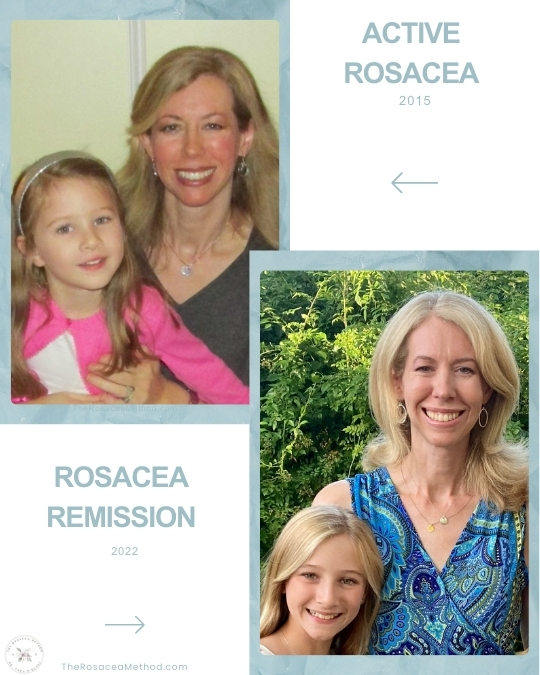
This experience led her to explore the connection between gluten and rosacea more deeply during a 30-day clean-eating challenge in December 2019, during which she fully eliminated gluten. The visible improvement in her skin was both surprising and motivating, prompting deeper research into why seemingly benign foods like dairy and gluten could still be problematic.
Gluten’s Impact on Chronic Skin Inflammation, Rosacea Symptoms, and Wheat Allergy
In the context of gluten and rosacea, this chronic skin disorder often flares up due to dietary rosacea triggers2—gluten being a major one for some people. 3
Each of the four types of rosacea can react differently to what you eat, so it’s really important to find nutrition that fits your specific needs.
Gluten is found in common grains like wheat, barley, and rye and has changed a lot since the 1940s due to genetic modifications to increase crop yields. This newer, denser wheat, genetically altered to withstand significant levels of pesticides, is far from the natural, unmodified grains our ancestors grew. Nowadays, our diets are packed with processed foods, from breakfast cereals to fast food, which are not only less nutritious but are also loaded with chemicals like glyphosate. Diets like these can upset our gut microbiome, leading to chronic inflammation and a weakened immune system.
For those of us with rosacea, this means more flare-ups and skin irritation, highlighting the undeniable link betweendiet and skin health. Reducing gluten might help to promote gut health, thereby reducing chronic inflammation and improving your immune system, since 70% of your immune system is housed in your gut!
What Does Current Science Say About Gluten and Rosacea?
There’s growing evidence that a gluten-free diet could help to improve or heal your rosacea. This approach helps to restore gut health, a known aggravator of rosacea, offering a natural alternative to traditional pharmaceutical treatments. Ongoing studies continue to explore the potential skin benefits of eliminating gluten from your diet and focusing on gut health.
1. Study Findings on Gluten Sensitivity in Rosacea Patients
Research on gluten and rosacea indicates that people with this skin condition might be more sensitive to gluten.4 This sensitivity can intensify their symptoms, making gluten-free diets a valuable recommendation in treatment strategies. (Always check with your personal physician before making any changes to your diet.)
- Diet and Rosacea: The Role of Dietary Change in the Management of Rosacea– This study suggests that avoiding certain foods might help manage rosacea by supporting a healthy gut. It discusses how a balanced gut can lead to clearer skin.5
- Rosacea, Germs, and Bowels: A Review on Gastrointestinal Comorbidities and Gut–Skin Axis of Rosacea – Research highlights the link between gastrointestinal health and skin condition. It explains that treating specific gut issues may help reduce rosacea flare-ups.6
2. Link Between Wheat Allergy and Rosacea Symptoms
Immediate allergic reactions to wheat can also trigger rosacea symptoms. Identifying and removing wheat from your diet might bring noticeable improvements in skin health.
- Gluten Intolerance and Its Association With Skin Disorders: A Narrative Review – This review explores how gluten sensitivity can aggravate skin issues like rosacea. It emphasizes the benefits of a gluten-free diet in easing skin inflammation and improving overall skin health.
The Impact of Dietary Changes on Rosacea
How Does Gluten Intolerance & Inflammation Affect Rosacea Flare-ups?
Gluten intolerance and its related inflammation can directly contribute to rosacea flare-ups, affecting blood vessels and worsening the skin condition. Eliminating gluten may stabilize your immune response and reduce skin irritation.
Can a Gluten-Free Diet Help Manage Rosacea?
Many find that addressing gluten and rosacea through a gluten-free diet reduces rosacea-related inflammation and enhances their overall quality of life due to improved gut health. This simple dietary shift could be the key to managing your symptoms more effectively.
Yet, not all rosacea has a link togut health.
While many rosacea cases are linked to gut health, it’s not universal. Some people still develop rosacea without any gastrointestinal problems such IBS or food sensitivities. This is where rosacea can be so confusing, because it appears in different people for different reasons. There is no one quick fix, and for many, addressing gluten and gut health may be a key factor.
“I would encourage you to experiment with gluten-free foods for at least a month and see what happens. For some of you there will be no change, but for many of you, the elimination of gluten will allow the gut healing process to begin. When your gut is not bombarded with gluten at every meal, it can begin to regenerate the cell wall and produce the enzymes necessary for food breakdown and nutrient absorption. When your liver is not overburdened by detoxifying glyphosate, nitrates, coloring, flavoring, caffeine and synthetic sweeteners at every meal, it can begin to break down the toxins that are already waiting to be processed.”
Dr. Tara O’Desky, The Rosacea Method
For those whose skin doesn’t improve after trying a gluten-free diet, exploring other potential causes of rosacea symptoms might be beneficial.
Gluten and Rosacea: 4 Tips for Healing Your Skin
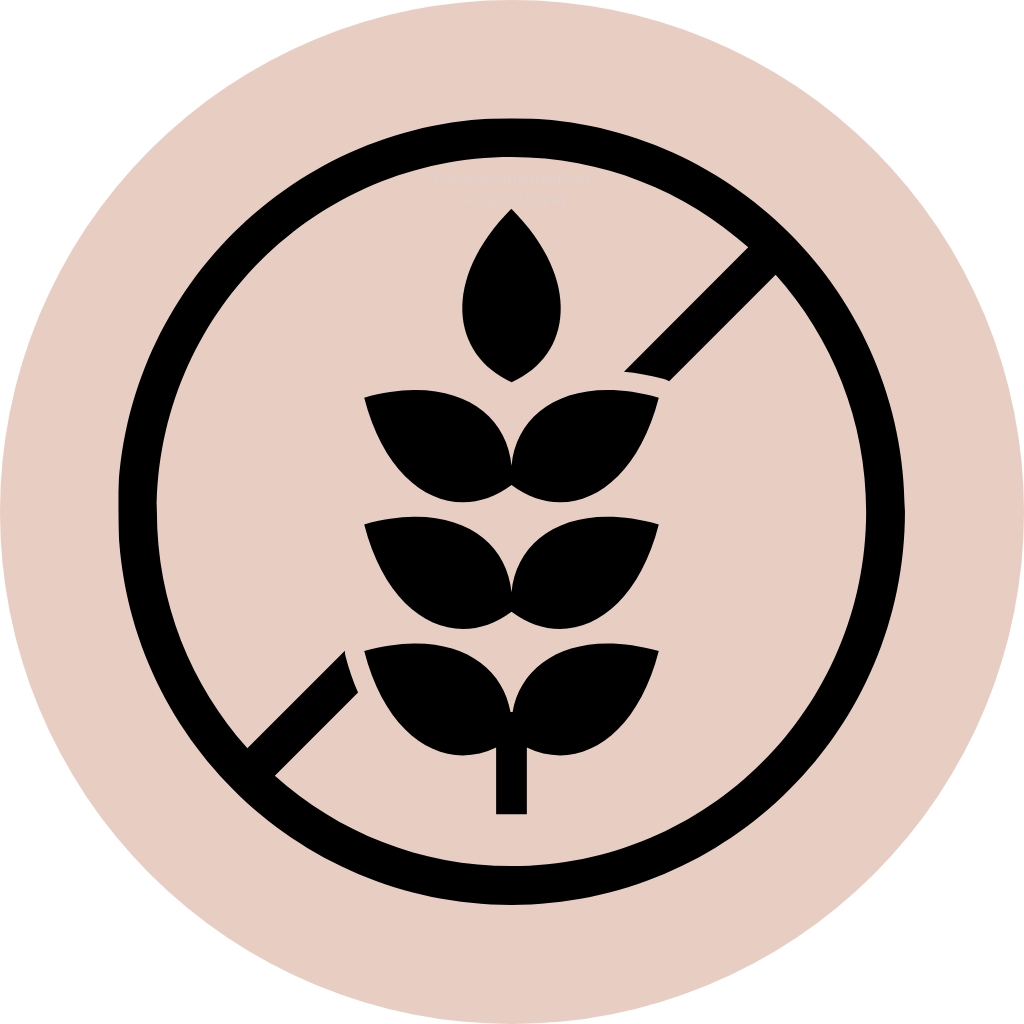 Gluten & Rosacea Tip # 1: Experiment with Gluten-Free
Gluten & Rosacea Tip # 1: Experiment with Gluten-Free
- Considering gluten’s undeniable role in gut disruption and chronic inflammation, trying a gluten-free diet might help calm your rosacea symptoms and promote gut health. Gluten can actually stay in your body for many weeks after consumption, so a week usually is not enough time to see a change! (Always check with your personal physician before making any changes to your diet.)
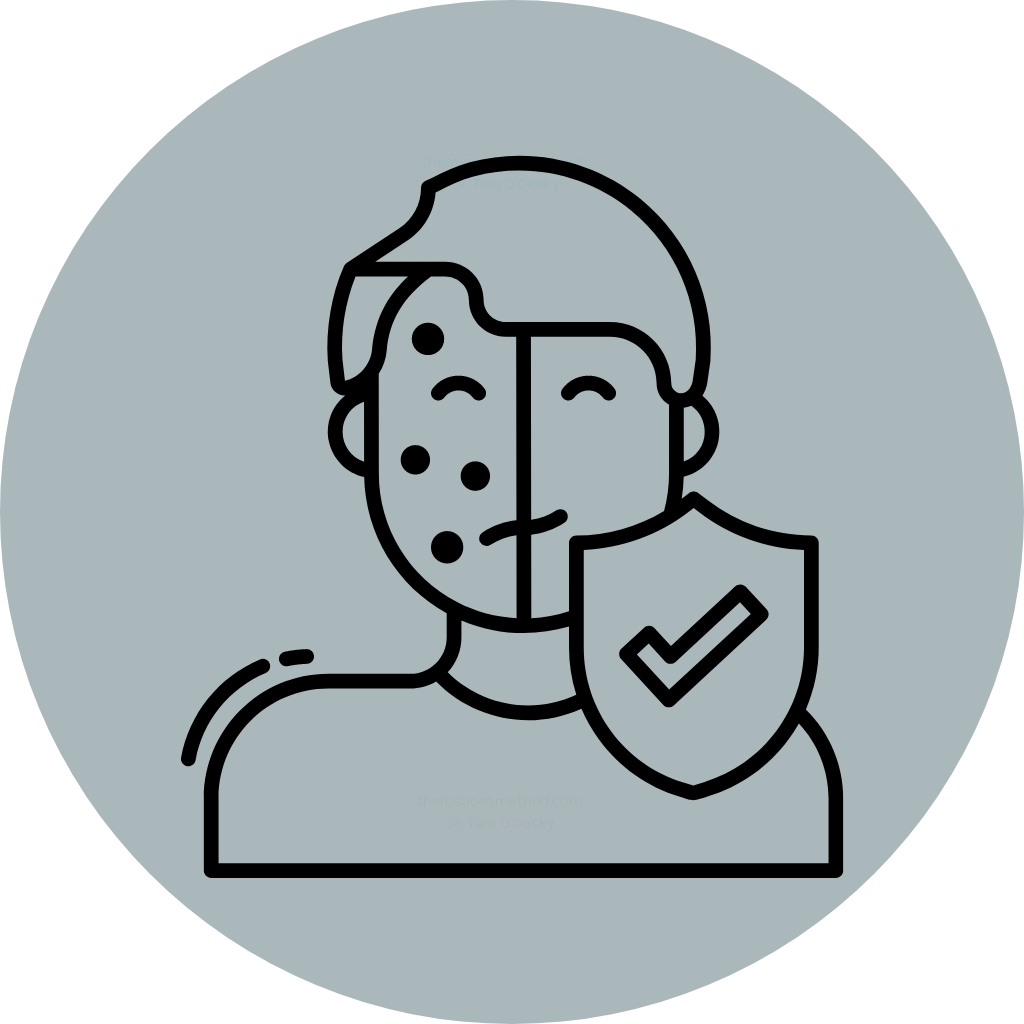 Gluten & Rosacea Tip # 2: Personal Response to Diet
Gluten & Rosacea Tip # 2: Personal Response to Diet
- Remember, not everyone is sensitive to gluten. If cutting out gluten doesn’t improve your rosacea, there are still many other factors to consider.
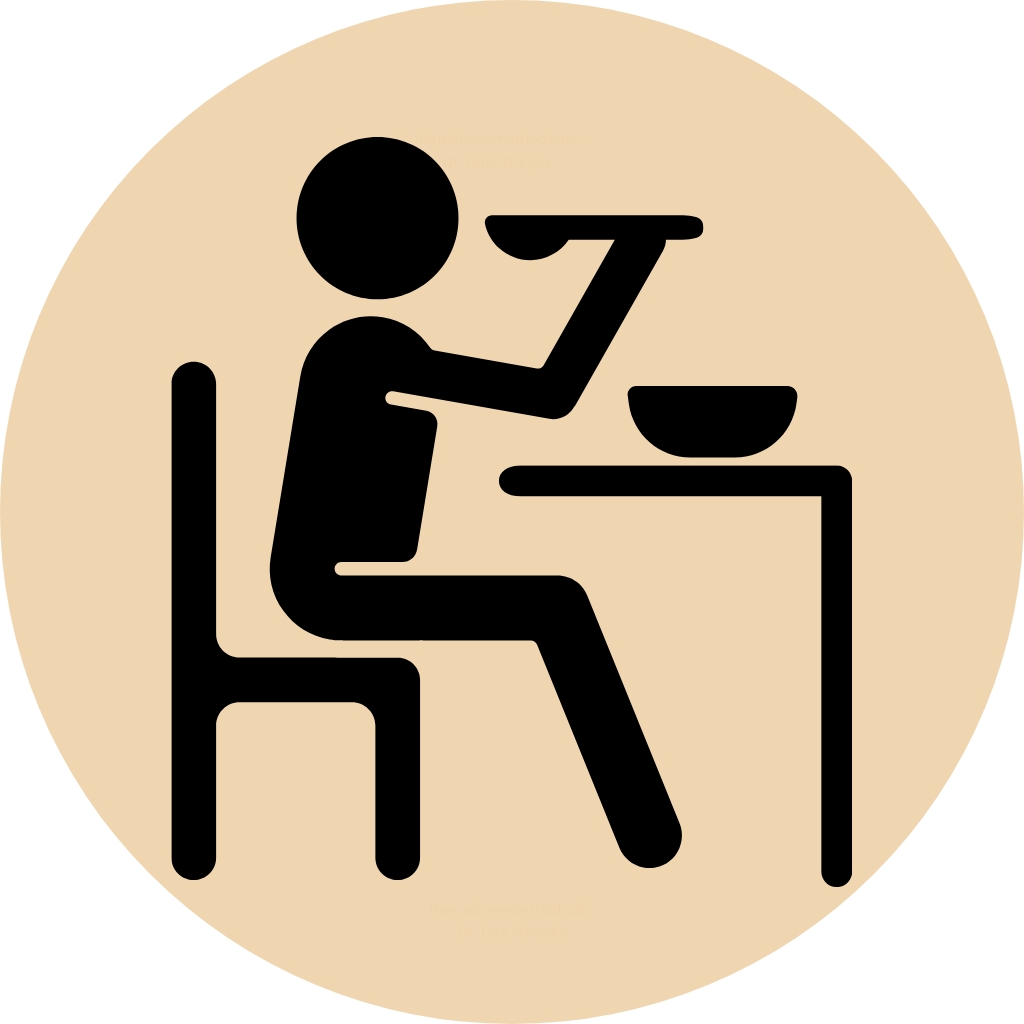 Gluten & Rosacea Tip # 3: Observe Changes During IllnessEating Habits
Gluten & Rosacea Tip # 3: Observe Changes During IllnessEating Habits
- If your skin clears up when your diet drastically changes (during an illness, for example), it could be a sign that dietary allergens such as gluten are influencing your rosacea.
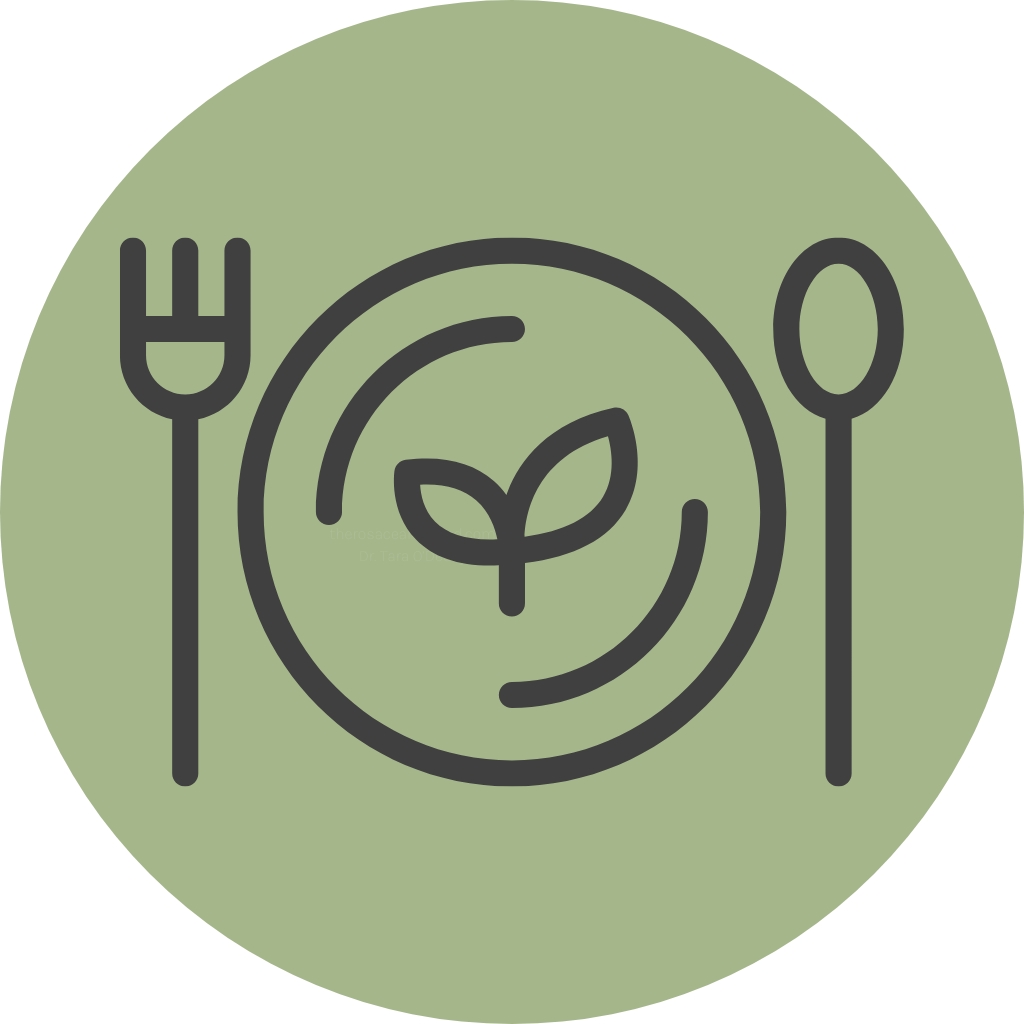 Gluten & Rosacea Tip # 4: Embrace Clean Eating
Gluten & Rosacea Tip # 4: Embrace Clean Eating
- Switch to organic, non-GMO foods free from added dyes, flavors, and other chemicals. Clean eating not only supports your skin but enhances overall health, reducing your body’s toxic burden.
Beyond Rosacea: Other skin issues linked to gluten
It’s not just rosacea—other skin conditions like eczema and psoriasis have also responded well to a gluten-free diet (GFD). Reducing gluten intake can be a crucial step in managing these conditions and improving skin health.
Skin Disorders Related to Gluten Intolerance7:
- Rosacea
- Eczema or Atopic Dermatitis (AD)
- Psoriasis 8
- Vitiligo depigmentation
- Alopecia Areata hair-loss
- Hives or Chronic Urticaria
- Dermatitis Herpetiformis (DH) 9
- Palmoplantar Pustulosis
- Canker Sores or Aphthous Stomatitis
- Hereditary Angioedema
- Linear IgA Bullous Dermatosis
Gastrointestinal Diseases Related to Rosacea10:
- Celiac Disease (CeD)
- Small Intestine Bacterial Overgrowth (SIBO)
- Irritable Bowel Syndrom (IBS)
- Chron’s Disease (CD
- Ulcerative colitis (UC)
- Helicobacter pylori infection (HPI)
Living Gluten-Free: Testimonials and Professional Advice
Gluten-free diets have effectively alleviated symptoms of multiple skin conditions by reducing autoimmune and inflammatory responses. Consistent adherence to such diets is often recommended for lasting benefits.
Healthcare professionals increasingly recommend eliminating gluten to patients with rosacea to help manage their condition effectively. Such dietary advice is based on overwhelming research connecting gluten to poor gut health, and poor gut health to rosacea.
Testimonials on Gluten-Free Lifestyle and Skin Improvement
Countless success stories underline the positive effects of a gluten-free lifestyle on skin health. Individuals often report significant improvements in their rosacea, backed by professional advice that underscores the benefits of this dietary approach.
Cut Gluten and Rosacea Symptoms May Finally Clear Up!
Rosacea healing takes time. This can’t be emphasized enough.
Two weeks of a new healthy nutrition is just not enough time for your rosacea to heal.
While gluten is often a contributing factor in your rosacea diagnosis, it is usually just one piece of the puzzle.
There are multiple other factors involved, ranging from household toxin exposure to eye mites to negative thoughts.
Problems with the inner workings of your body caused rosacea to appear in the first place; healing must start on the inside, and the results will show in your skin, given time.
So, if you’re ready to tackle this from the inside out, we’re here to help you every step of the way.
Discover how The Rosacea Method can guide you to clear, healthy skin.
FAQs on the Gluten and Rosacea Connection
Can cutting out gluten help with rosacea?
Yes, eliminating gluten can be beneficial for some people with rosacea, particularly if they have a gluten sensitivity or celiac disease. Gluten can cause gut inflammation, which might exacerbate rosacea symptoms. A trial period of gluten-free dieting could help determine if gluten is an underlying cause of your rosacea.
Can gluten cause face redness?
Gluten can cause facial redness in individuals who have gluten sensitivity or celiac disease. In these cases, consuming gluten leads to an inflammatory response, which may manifest as redness or flushing on the face along with other rosacea symptoms.
What does a gluten rash look like?
A gluten rash, often associated with dermatitis herpetiformis, typically appears as clusters of itchy, blistering lesions. These rashes are most common on the elbows, knees, back, buttocks, and back of the head. Dermatitis herpetiformis is directly linked to gluten consumption and is known to be extremely itchy and blistering.
What skin conditions are caused by gluten intolerance?
Besides dermatitis herpetiformis, gluten intolerance can exacerbate or trigger conditions such as rosacea and eczema. Some individuals may also notice an increase in acne or other inflammatory skin responses due to gluten-related gastrointestinal issues affecting overall inflammation levels in the body.
What is the connection between gluten and rosacea?
Some individuals with rosacea may experience flare-ups triggered by gluten consumption, although the relationship is not fully understood.
Can gluten cause dermatitis herpetiformis?
Yes, dermatitis herpetiformis is a skin condition associated with celiac disease and triggered by gluten consumption.
How is celiac disease diagnosed in relation to rosacea?
Celiac disease can be diagnosed through blood tests measuring specific antibodies related to gluten, which may also impact skin conditions like rosacea.
What are some common treatments for gluten-related skin issues like rosacea?
Treatment may involve a gluten-free diet, allergy testing, and consultation with a functional medicine doctor for tailored solutions.
Is there a cure for gluten-induced skin conditions such as rosacea?
While managing gluten intake can help reverse symptoms, there is no known pharmaceutical cure for conditions like rosacea that are influenced by gluten sensitivity. However, many people have reversed the symptoms 100% through dietary and lifestyle changes.
How does gluten contribute to malabsorption and skin problems like acne?
Gluten can cause inflammation destruction of the microbiome in the gut, leading to malabsorption of essential nutrients and potentially contributing to skin issues like acne and rosacea through internal imbalance and suppressed immune system.
Are there any known comorbidities between gluten-related disorders and skin conditions such as eczema?
Some individuals may experience comorbidities where gluten sensitivity affects both the digestive system and the skin, leading to conditions like eczema.
References
- Weiss E, Katta R. Diet and rosacea: the role of dietary change in the management of rosacea. Dermatol Pract Concept. 2017 Oct 31;7(4):31-37. doi: 10.5826/dpc.0704a08. PMID: 29214107; PMCID: PMC5718124. ↩︎
- Weiss E, Katta R. Diet and rosacea: the role of dietary change in the management of rosacea. Dermatol Pract Concept. 2017 Oct 31;7(4):31-37. doi: 10.5826/dpc.0704a08. PMID: 29214107; PMCID: PMC5718124. ↩︎
- Bell KA, Pourang A, Mesinkovska NA, Cardis MA. The effect of gluten on skin and hair: a systematic review. Dermatol Online J. 2021 Apr 15;27(4):13030/qt2qz916r0. PMID: 33999573. ↩︎
- Vats V, Makineni P, Hemaida S, Haider A, Subramani S, Kaur N, Butt AN, Scott-Emuakpor R, Zahir M, Mathew M, Iqbal J. Gluten Intolerance and Its Association With Skin Disorders: A Narrative Review. Cureus. 2023 Sep 1;15(9):e44549. doi: 10.7759/cureus.44549. PMID: 37790051; PMCID: PMC10544948. ↩︎
- Weiss E, Katta R. Diet and rosacea: the role of dietary change in the management of rosacea. Dermatol Pract Concept. 2017 Oct 31;7(4):31-37. doi: 10.5826/dpc.0704a08. PMID: 29214107; PMCID: PMC5718124 ↩︎
- Losurdo G, Principi M, Iannone A, Amoruso A, Ierardi E, Di Leo A, Barone M. Extra-intestinal manifestations of non-celiac gluten sensitivity: An expanding paradigm. World J Gastroenterol. 2018 Apr 14;24(14):1521-1530. doi: 10.3748/wjg.v24.i14.1521. PMID: 29662290; PMCID: PMC5897856. ↩︎
- Vats V, Makineni P, Hemaida S, Haider A, Subramani S, Kaur N, Butt AN, Scott-Emuakpor R, Zahir M, Mathew M, Iqbal J. Gluten Intolerance and Its Association With Skin Disorders: A Narrative Review. Cureus. 2023 Sep 1;15(9):e44549. doi: 10.7759/cureus.44549. PMID: 37790051; PMCID: PMC10544948. ↩︎
- Bhatia BK, Millsop JW, Debbaneh M, Koo J, Linos E, Liao W. Diet and psoriasis, part II: celiac disease and role of a gluten-free diet. J Am Acad Dermatol. 2014 Aug;71(2):350-8. doi: 10.1016/j.jaad.2014.03.017. Epub 2014 Apr 26. PMID: 24780176; PMCID: PMC4104239. ↩︎
- Ohlsen BA. Acupuncture and a gluten-free diet relieve urticaria and eczema in a case of undiagnosed dermatitis herpetiformis and atypical or extraintestinal celiac disease: a case report. J Chiropr Med. 2011 Dec;10(4):294-300. doi: 10.1016/j.jcm.2011.06.003. PMID: 22654688; PMCID: PMC3315874. ↩︎
- Losurdo G, Principi M, Iannone A, Amoruso A, Ierardi E, Di Leo A, Barone M. Extra-intestinal manifestations of non-celiac gluten sensitivity: An expanding paradigm. World J Gastroenterol. 2018 Apr 14;24(14):1521-1530. doi: 10.3748/wjg.v24.i14.1521. PMID: 29662290; PMCID: PMC5897856. ↩︎
MEDICAL DISCLAIMER
This content is for informational and educational purposes only. It is not intended to provide medical advice or to take the place of such advice or treatment from a personal physician. All readers/viewers of this content are advised to consult their doctors or qualified health professionals regarding specific health questions. Neither Dr. Tara O’Desky nor the publisher of this content takes responsibility for possible health consequences of any person or persons reading or following the information in this educational content. All viewers of this content, especially those taking prescription or over-the-counter medications, should consult their physicians before beginning any nutrition, supplement, or lifestyle program.
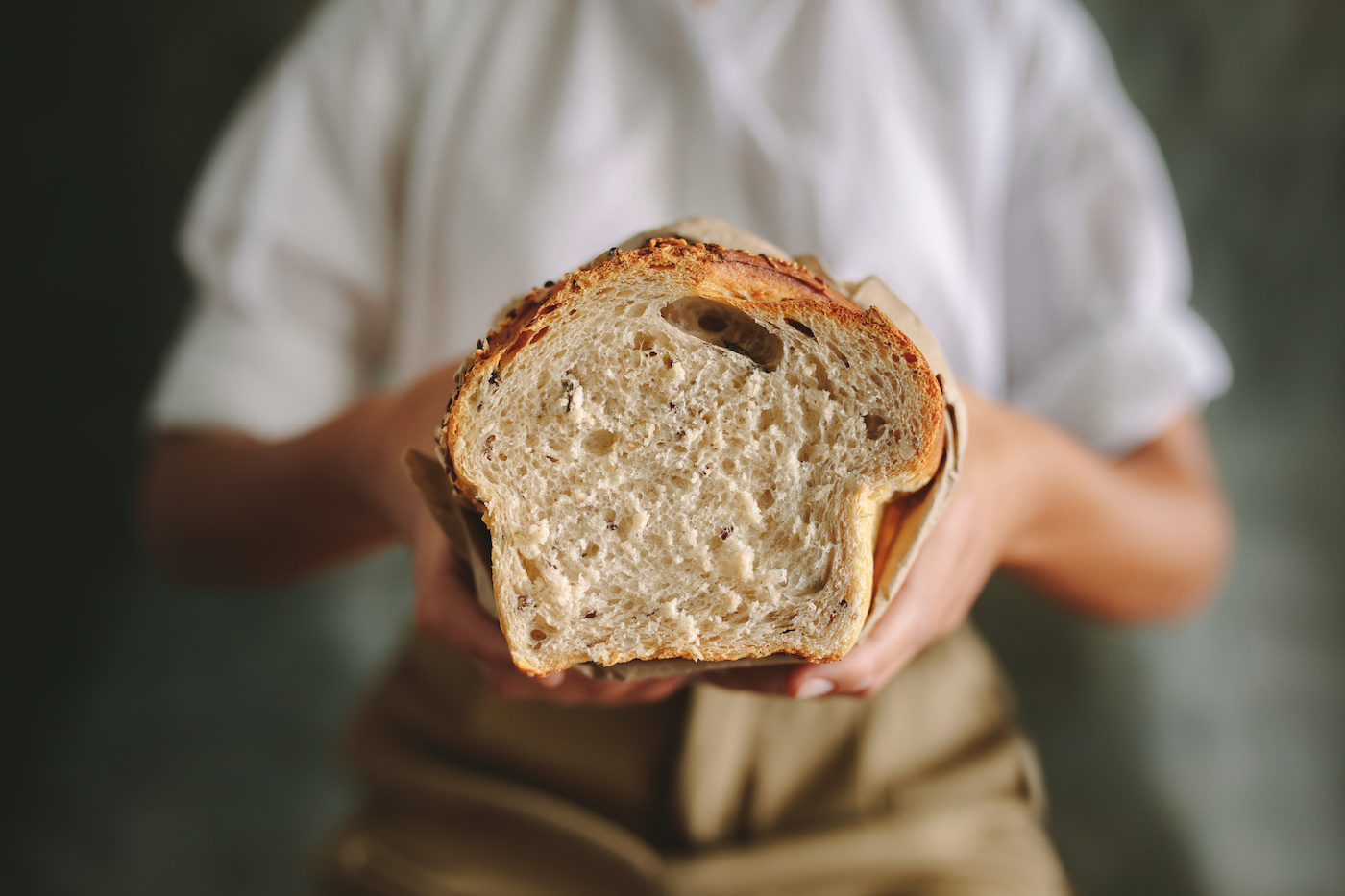
Leave a Reply
Learn More About Me
20 years of rosacea
- rosacea
- chronic skin issues
- gut issues
- food sensitivities
- inflammatory conditions
After 20 years of ineffective treatments and medications,Dr. O'Desky reversed her rosacea 100% through dietary changes and food-based medicine.
Health Coach & Holistic Skin Expert
Meet
Dr. Tara O'Desky
Since developing her own holistic healing program,
The Rosacea Method, she has helped countless patients of all ages with:
- rosacea
- chronic skin issues
- gut health
- food sensitivities
- inflammatory conditions
Dr. O'Desky continues to see patients in private practice in the USA and also sees clients via Telehealth. She currently offers various programs and workshops forpeople all over the world dealing with chronic health issues, poor gut health, and rosacea.
Health Coach and Holistic Skin Expert
Meet Dr. Tara O'Desky
-L. M.
"I want to say thank you so much for the program!
I never feel hungry anymore. My diet has opened up a ton and I feel really healthy and excited learning that there’s so many things I can eat now that are healthy and tasty. I felt good through the entire cleanse and my skin has definitely improved."
-Anonymous
"I felt so hopeless and I could not see light at the end of the tunnel. Now I have hope again and I feel more positive about my situation overall! Yes it can definitely heal, I have so so sure others heal! This program is great, I feel like It covers everything! Thank you! "
-Darlene B
"For the first time in 6 years, I feel like I have been given a clear direction to go in that will actually heal my skin. There's so much guess work that comes along with skin complications and Tara helps to clear all that up.Recommend 1000%."
This is really helpful. Thank you!
You’re very welcome!
You info has been amazing !!!! Makes you feel like you’re not alone in this journey.
You’re not alone at all… and you’ll get there!
I have eliminated most of the gluten foods, but my skin has not changed. I believe the only food I am currently eating with gluten is granola. I will remove it from my diet and see if anything changes!
Gluten can certainly be a factor for some people, but not for everyone. Rosacea is often tied to chemical exposures, liver, spleen, viruses and heavy metals!
I also have eliminated gluten for a month but my rosacea has not really eased up…however, the bloating feeling after eating has changed a lot! I have to think that my rosacea has a lot of different kind of rootes. I would love to discover them through your program🤗
Yes, eliminating gluten can be very helpful for gut health, but rosacea usually involves many other factors. Keep going!
Very helpful information
Thanks Dr. Tara
It’s really interesting to see how rosacea, gluten, and diet-related inflammation are connected.
It gives me hope I can get control of it—thank you!
I found out I do have a gluten sensitivity! No wonder I felt so tired after eating for years. My skin has improved since cutting gluten. Still working on what the other cause may be!
I have found cutting gluten out has significantly helped my rosacea and gut health.
For quite some time I was convinced my body reactions like rosacea, bloating etc are caused by lactose. Despite cutting out dairy, all the symptoms got worse in the past few months. So recently I started experimenting with a gluten-free diet and so far it seems to make a difference
It does for so many of us!
Dr. Tara, thank you so much for sharing all of this knowledge on the gluten-body connection. This is so much more informative and effective than being told to stay away from certain foods for life!
I agree!
Thank you gor this made a big difference for me
I also noticed that cutting out gluten helped lowering the frequency of my rosacea flare ups !
I’ve cut out (back) on gluten for over a year. I do feel like it helps rosaces but still definitely struggle with it. Thanks for sharing!
It can be helpful, but still just a small piece of rosacea!
Best profile for rosacea
Thank you so much for sharing such excellent information. I can’t wait to try your rosacea method!
Your rosacea method is very inspiring. I really appreciate the approach you’ve shared.
I couldn’t figure out why I had rosacea for years and coming across your posts really helped me pinpoint my triggers and manage it better! I finally feel confident in my skin again after years of hiding and running away because of it. Thank you!!!
You’re so very welcome! I’m so happy my website has been helpful!
I gave up gluten after finding your page and I was no longer constipated and saw some differences. Can’t imagine how I would feel after learning much more information from you.
You will feel AMAZING! Hope you join!
I think I’ve always had suspicions that I may have coeliac disease. I think I’m 100% invested into cutting these triggers out to heal my gut now!
Wonderful! My celiac was not diagnosed until I was 48!!!
I definitely see more flare ups when I eat gluten. However, I still have redness and flare ups even when I cut it out of my diet. So something else is definitely happening.
So helpful! Love all your posts thank you!
You’re so welcome! Glad you enjoy them.
Thank you for bringing awareness of the link between Rosacea and gluten .
Happy to do so!
Thank you for bringing awareness of the link between Rosacea and gluten .
Highly informative and very helpful, so grateful for your input.
You’re so welcome!
So informative! Can’t wait one day to join your programme!
We are so happy you’ve found the posts helpful!
This is so interesting! My grandmother was finally diagnosed with celiac disease in her 70s, and I’ve always wondered if I struggled with gluten as well or if it’s a rosacea trigger. Crazy how much our diet can affect us!
They certainly can! You should get tested as soon as possible!
You rock😀
The paradox: a person with gluten sensitivities can develop celiac disease by completing eliminating gluten. Thus, it is difficult to know how much to consume.
Gluten has no benefit, and sadly only causes disruption to the gut, even for those who are not sensitive. If you are sensitive, I’d stay away!
Thanks for sharing this info. (And also commenting to enter the giveaway :))
Very useful article.
So glad you enjoyed it!
Really helpful article.
Thank you so much for this article, ypu have so many wonderful free resources 🥰
Enjoy!
Thank you for sharing the article about gluten and rosacea! It was really insightful
I’m still trying to figure out which foods flare my rosacea. Such a good read for me to try and understand which foods don’t work for my body.
Ultimately, we teach you in my program not to worry about the foods that make you flare, and instead to focus on the foods which detroy your gut! This will be the foundation of your rosacea healing.
Pick me please! I’ve been wanting to start your program and just haven’t been able to💖
I haven’t been able to purchase Dr Tara rosacea program as it’s out of budget (converting to aus dollars) but just following Tara’s advice on instagram I’m already seeing a huge reduction in my redness. One of the biggest triggers for me i think is gluten. Would love to win to continue my healing progress. Thank you Dr Tara x
I’m so happy to hear you’re seeing progress! I have tons of free content available here on my blogs and IG account! Keep going!